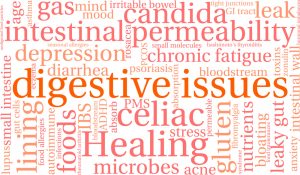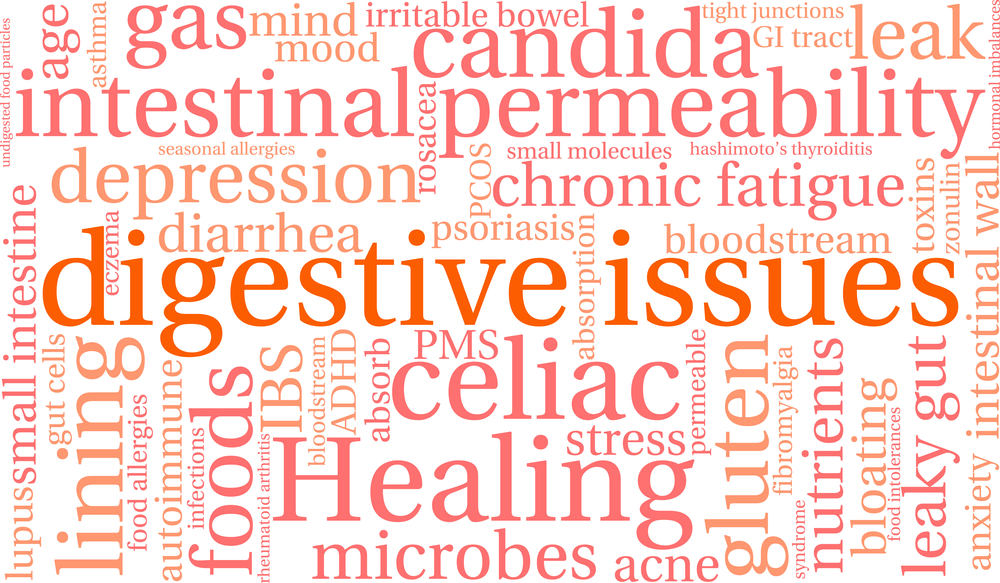7 Signs and Symptoms of Digestive Issues
7 Signs and Symptoms of Digestive Issues
Our Blog
7 Signs and Symptoms of Digestive Issues
 The digestive system makes up a large part of your body, and its processes allow you to get rid of waste and absorb the nutrients you need. With the increased intake of processed foods, chemicals in foods, antibiotics, and medications, digestive issues affect a large number of people. In fact, between 60 and 70 million Americans suffer from some type of digestive disease.
The digestive system makes up a large part of your body, and its processes allow you to get rid of waste and absorb the nutrients you need. With the increased intake of processed foods, chemicals in foods, antibiotics, and medications, digestive issues affect a large number of people. In fact, between 60 and 70 million Americans suffer from some type of digestive disease.
Symptoms of Digestive Issues
The symptoms of digestive issues can be embarrassing, and they are not something easily discussed in public. Unfortunately, that means that many people suffer in silence rather than talk about their issues and seek help. Some of those symptoms you’re probably familiar with, such as constipation, heartburn, and gas. However, there are other minor symptoms and problems related to digestive issues that you might dismiss and leave untreated.
Treatment Matters
Leaving any digestive symptoms and issues untreated can potentially lead to more serious illnesses, so it’s vital to understand the signs and symptoms of digestion problems. Know what emergency symptoms to look out for, so you can get medical help or make any lifestyle changes that can improve your digestive system. Here are some common and not-so-common signs and symptoms of digestive issues, as well as what you can do to treat them.
1. Reflux
If you’ve ever felt a burning or hot sensation rising in your chest at night or after a meal, you’ve likely experienced reflux. It’s one of the most common digestive issues, and if you experience it at least twice per week and it affects your daily life, it could indicate that you have gastroesophageal reflux disease or GERD. Along with the heartburn, reflux can also leave you with a bad taste in your mouth, hypersalivation or even food in your mouth. Reflux happens when stomach acid backs up into your esophagus, and it can be caused by certain foods, alcohol, pregnancy, and some medications.
Dangers of Reflux
Persistent reflux and GERD can damage your esophagus over time, and even potentially lead to esophageal cancer. The symptoms of reflux should be taken seriously due to the potential harm. If you experience frequent heartburn, nausea, tooth erosion, chest pain or difficulty breathing, you should see a doctor.
Treating Reflux
For less severe cases of reflux, over-the-counter antacids or medications that reduce acid levels are often sufficient in treating the symptoms. Many people find relief simply by avoiding any food or beverage known to cause reflux symptoms. Keeping your head elevated rather than lying flat at night may help to quell some of the symptoms, too. Some serious cases of GERD may require stronger medication or even surgery. The surgical procedure consists of a tightening of the muscle between the stomach and esophagus to prevent the upward flow of stomach acid.
2. Bad Breath
Do you brush your teeth over and over but still can’t get rid of foul-smelling breath? If so, the issue may be deeper than just a dirty mouth. Digestive issues can be a major cause of bad breath, and the type of smell may help indicate what the issue it. For example, a fruity smell can indicate uncontrolled diabetes, and a fishy smell might point out kidney problems. Reflux may also cause bad smelling breath.
Treating Bad Breath
An imbalance of good and bad bacteria in your gut can make bad breath worse, so include probiotics in your diet to help balance your gut flora. Fermented foods also help improve your digestion and feed the good bacteria, which will improve the smell of your breath.
3. Food Intolerance
Digestive issues may be an underlying cause in the development of food allergies in kids. Typically, food intolerance is caused when a certain digestive enzyme needed for processing certain types of foods is deficient.
Lactose Intolerance
One common example is lactose intolerance. If you lack the lactase enzyme, your body may not be able to digest lactose, which is the sugar found in dairy products. While the severity of the symptoms varies from person to person, they typically include nausea, diarrhea, cramping, bloating and gas. Symptoms of lactose intolerance usually show up anywhere from 30 minutes to two hours after consuming dairy.
Allergies
The words intolerances and allergies are often used interchangeably, but food allergies are often more severe than intolerances. Allergies need to be approached differently. You should always discuss reactions you may have to foods with your doctor. While food intolerances only affect digestion, allergies can trigger reactions such as hives and respiratory issues.
Treating Food Intolerance and Allergies
If you have an allergy, you should avoid any type of food that triggers your symptoms. With intolerance, sometimes over-the-counter pills can replace the deficient enzyme and allow you to eat certain types of foods. You may find you are able to tolerate small amounts of certain types of food, as well.
4. Irritable Bowel Syndrome
If you suffer from stomach pain or discomfort at least three times per month over a course of several months, you may have irritable bowel syndrome (IBS). This common digestive problem affects up to 15 percent of Americans. The signs of IBS vary, but they are typically caused by certain trigger foods like dairy, alcohol, beans, caffeine and gas-producing foods. You may have hard stools one day and loose ones the next, or you may be constipated after one trigger food and have diarrhea after another.
Treating IBS
While the cause isn’t currently known, treating IBS mainly involves a change of diet. Avoiding foods that trigger IBS symptoms is the first step. Some people find relief by following a diet that is low in fat but high in fiber. Probiotics can also help ease the symptoms.
5. Constipation
Americans spend millions of dollars on laxatives every year, suggesting that constipation is a widespread problem in the country. Constipation is a sign that your body is having trouble getting rid of waste. Typically, it happens when the colon can’t pass stools through the digestive tract. If you suffer from constipation, you may feel bloated, experience abdominal pain and have painful, infrequent stools. The “normal” frequency of stools is anywhere between three a day and three a week. If you’ve gone a week without passing a stool, you may want to see your doctor. Constipation can lead to other issues as well. The hard stools and straining that often accompany constipation can all lead to hemorrhoids or an anal fissure.
Treating Constipation
While you may be inclined to turn to laxatives as your first solution, keep in mind that you may become dependent on them, requiring more over time and eventually rendering them ineffective. Instead, increase your fiber and water intake and make sure to get enough exercise. High fiber foods include whole grains, vegetables, and fruits. Milk of magnesia is another remedy you can try to get things moving. Check the side effects of any medications you are taking, as they may be the cause of your constipation.
6. Skin Conditions
If you struggle with acne, eczema, psoriasis or rosacea, you may be surprised to learn that these conditions often are caused by digestive issues. Dry and flaky skin may be a sign that your body is low in the enzyme lipase and cannot properly digest fat. Additionally, if your digestive system is struggling to properly break down food, you won’t be able to get all of the benefits of skin-friendly vitamins like A, K, and E.
Vitamins and Balance
Vitamin A is essential for preventing acne, repairing skin, and boosting the immune system to ward off acne-causing bacteria. Vitamin K speeds up healing and prevents pimples, while vitamin E is an antioxidant that helps protect skin and keep it healthy. If the balance between good and bad bacteria in your gut is off, you may experience inflammation that leads to uneven skin tone. Chronic inflammation can also cause a breakdown in collagen, leading to wrinkles and sagging skin.
7. Weight Fluctuations
Both weight loss and weight gain are symptoms of digestive issues. You may experience unexplained weight loss if your body is unable to fully absorb the nutrients it needs from your food. Constipation and slow bowel movements may lead to weight gain. If you struggle with reflux or ulcers, you may eat frequently to ease the pain, which can also lead to weight gain. Bloating caused by food intolerance, IBS, and poor digestion can also be mistaken for weight gain.
The Root of Symptoms
Some of the signs and symptoms of digestive issues are obvious, such as upset stomach, heartburn, and either too few or too many stools. However, there are more symptoms that can manifest from digestive issues that aren’t quite as obvious. If you struggle with things like bad breath, skin issues, and even things like brittle nails and arthritis, your digestive system may be at the root of your symptoms.
Things like poor nutrient absorption, slow moving bowels, and food intolerance can all trigger uncomfortable and sometimes embarrassing symptoms. However, you shouldn’t feel ashamed to talk about these issues, since leaving them untreated can lead to even bigger problems.
Thank you for reading our blog! How can we help you? Contact us today.


